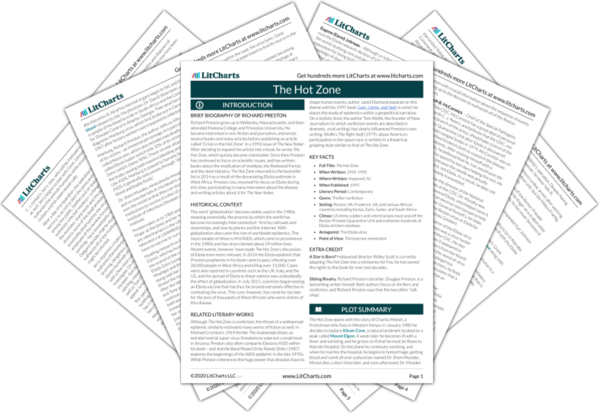Summary
Analysis
Dan Dalgard, horrified, rushes to help Milton Frantig indoors, and makes him lie down on a couch. Frantig also has a terrible cough, and feels faint—he suggests that maybe the bad smell of the monkeys made him retch. Dalgard sends Bill Volt out to get a thermometer, and the men discover that Frantig has a 101 degree fever. While Dalgard and Volt are near frantic, Frantig is relatively calm. He is a devout Christian, and believes that God has a plan for him.
As readers know well by now, vomiting, coughing, and fever are all potential signs of an Ebola infection. Frantig’s potential illness underlines the consequences of the monkey house’s employees’ false sense of security. Frantig’s religious response show how differently people react to potentially life-shattering events like Ebola.
Themes
Dan Dalgard rushes over to the Hazleton Washington offices, deciding that the monkey facility must be evacuated immediately, since two of its four workers are now ill. He goes to see the general manager, weeping, and recommends that the Army take control of the situation. The general manager agrees, and Dalgard returns to his own office, where a group of C.D.C. officials wait for him. He tells them what’s happened, adding that he wants to turn over the facility to USAMRIID. The C.D.C. people agree, and express a desire that Milton Frantig be moved to Fairfax Hospital, where they can observe him.
At last, Dalgard seems to truly understand the gravity and scope of the crisis before him, and makes the right decision by turning over all responsibility to USAMRIID. The presence of the C.D.C. officials, meanwhile, reminds us that even during times of peril, humans still exhibit possessiveness, jealousy, and ambition.
Themes
Next Dan Dalgard calls C. J. Peters and informs him that Milton Frantig is ill. He tells Peters that the facility and animals are now “the responsibility of USAMRIID.” Peters feels uneasy about the idea that the Army will be “responsible” if anything goes wrong, and says that he must clear this decision with his superiors. Next they discuss Frantig, and Peters is disturbed that he will be taken to Fairfax Hospital rather than the Slammer. Getting off the phone with Dalgard, Peters calls Joe McCormick to try to persuade him to turn Frantig over to the Institute. McCormick, however, refuses, believing that it is difficult to transmit Ebola, and that a spacesuit is unnecessary to treat him. Although Peters disagrees with McCormick and dislikes him intensely, he admires the man’s ability to make strong decisions in a crisis.
The quibbling over the word “responsible” illustrates the delicacy of the Institute’s position, and also underscores the human tendency to focus on small details—and to try and avoid culpability—even during times of crisis. This sense of human error only heightens during the conversation between Peters and McCormick. Rather than reaching any kind of compromise, their talk only reignites their rivalry. Despite all of his faults, McCormick still demonstrates courage and certainty in the face of great danger, qualities that are desperately important when combating this kind of virus.
Themes
As this all occurs, a news van arrives at the monkey house just in time to see an ambulance take Milton Frantig away. Alone in an isolation ward, Frantig begins to feel better. He prays and watches TV. Meanwhile, the remaining employees at the monkey house are unable to handle the situation anymore. They leave the facility and lock the door behind them, leaving behind 450 monkeys. The temperature inside is over ninety degrees, and the monkeys are restless because they haven’t been fed. Some monkeys fall into a coma-like state, their eyes glazed. Some even begin to bleed, and their blood pools in metal trays under their cages.
The arrival of the news van could not come at a worse time, showing how difficult it is to keep an operation of this size a secret. As the keepers leave the monkey house, the conditions within it descend from horrific to outright hellish. The “hot zone” has become a physical place, boiling with heat, filled with dying creatures, and ripe with the potential for infection. The bleeding monkeys in particular make clear how easy it would be for the virus to continue spreading.
Themes
Get the entire The Hot Zone LitChart as a printable PDF.













